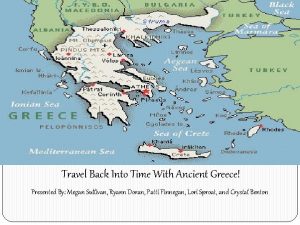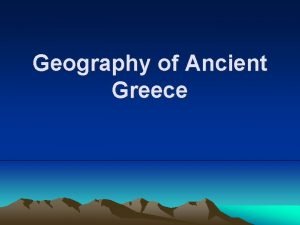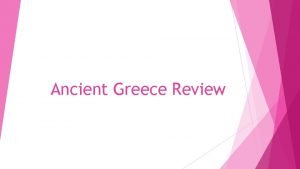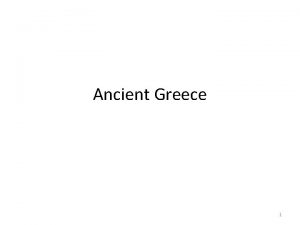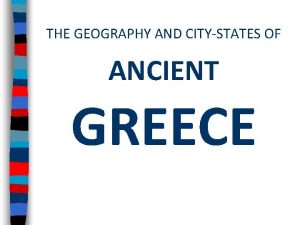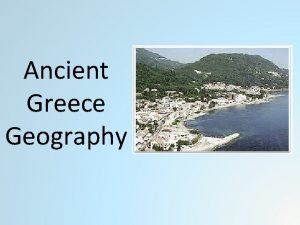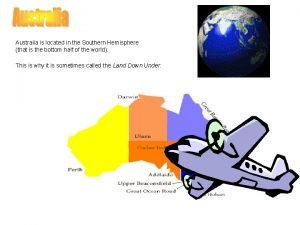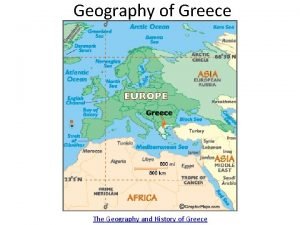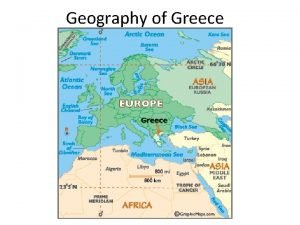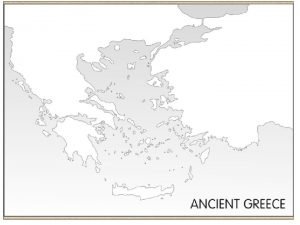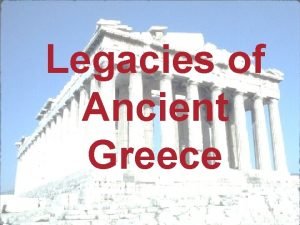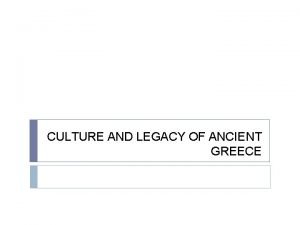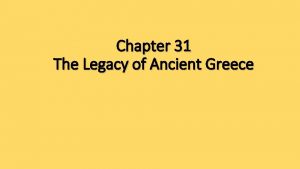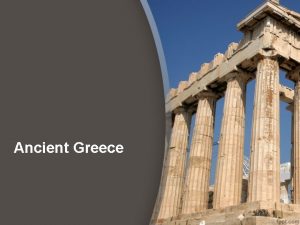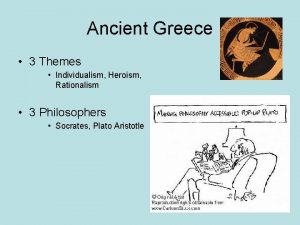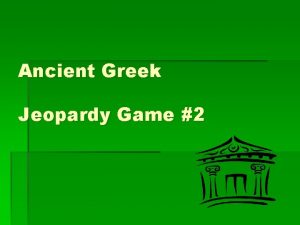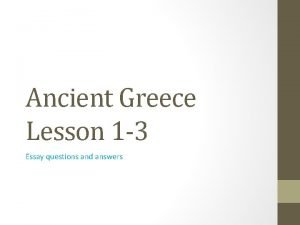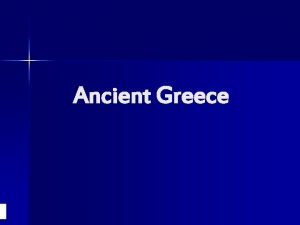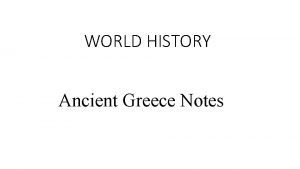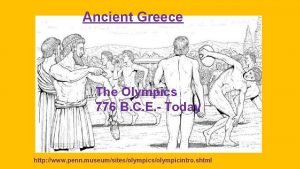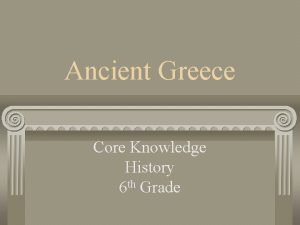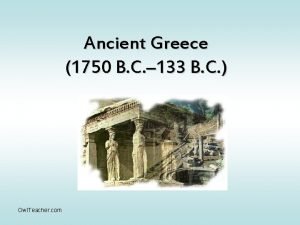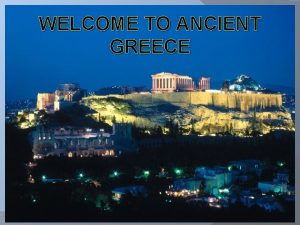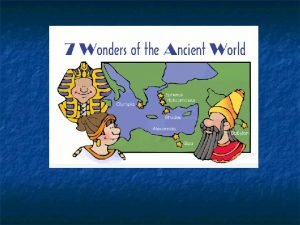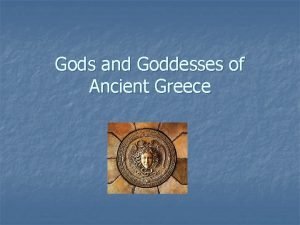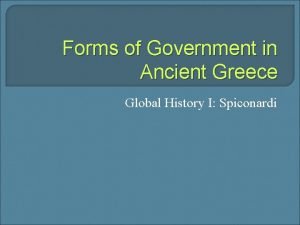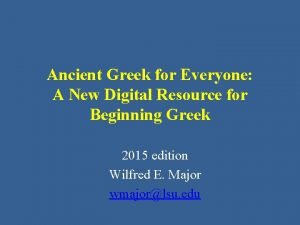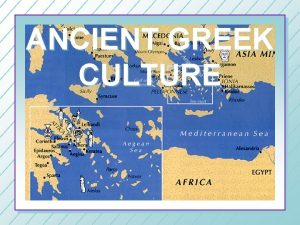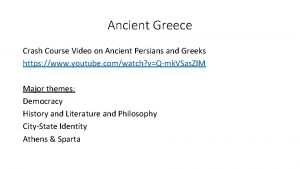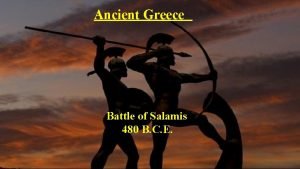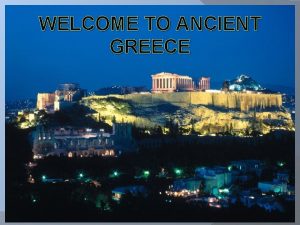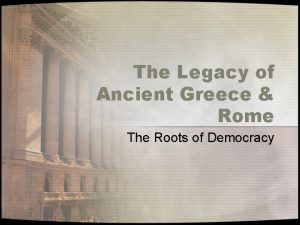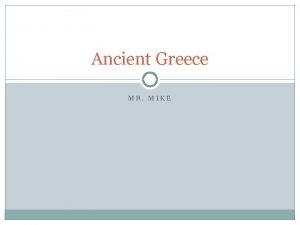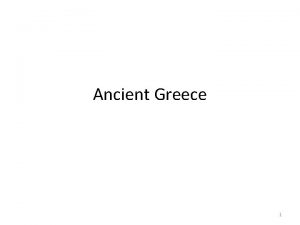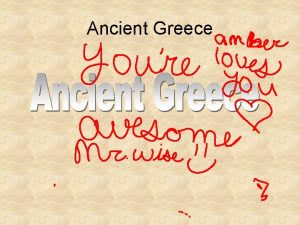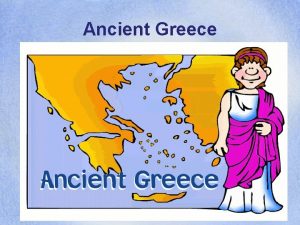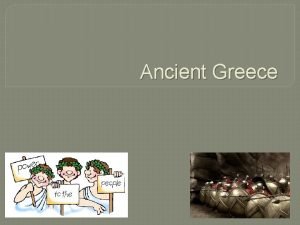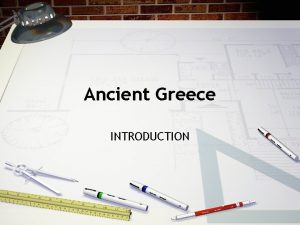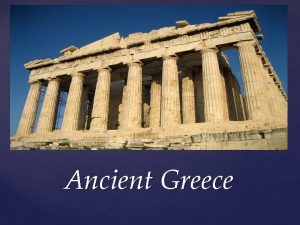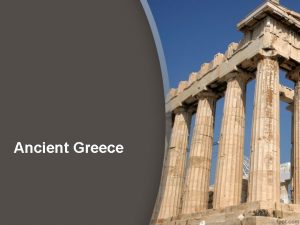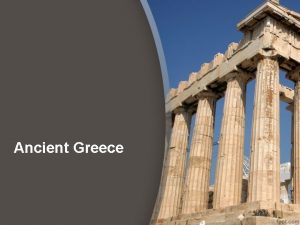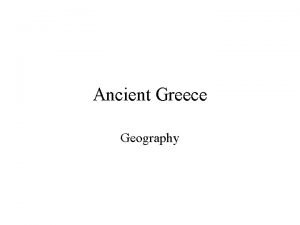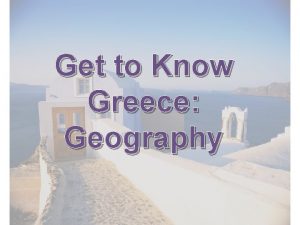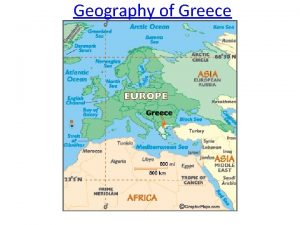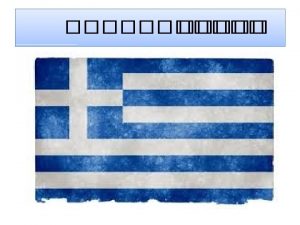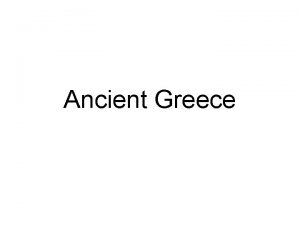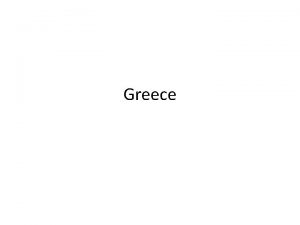ANCIENT GREECE Geography Located in the southern part
















































- Slides: 48

ANCIENT GREECE

Geography �Located in the southern part of Europe’s Balkan Peninsula; very mountainous, and many islands. (Island of Crete; Peloponnesus peninsula; Mt. Olympus). � Mountains protected and isolated the Greeks on the mainland. � Greek people never united under one government. � People depended on the sea-trade for their living. (Aegean, Mediterranean, Ionian, Black)

World Map

Maps of ancient Greece

Geography �Climate was mild (Mediterranean Climate); conducive to outdoor public meetings. (theater, schools, government) �Climate and trade was great for olives, wine, and barley

Aegean Civilizations �Minoans (2500 to 1450 B. C. ) � concentrated on the island of Crete. �Wealthy people with palaces (indoor bathrooms, fireboxes) who decorated with brightly colored murals and enjoyed dancing and sports. � Destroyed by a tidal wave caused by earthquake.

Palace of Knossos

Palace of Knossos

Aegean Civilizations �Mycenaeans (2000 to 1100 B. C. ) � also lived on Crete; combined with Minoans to form ancient Greece. � Married with local people (Hellenes) after extending boundary to the Balkan Sea. � Built stone walls for protection. � Government kept detailed records of taxes, crops, and livestock.

The Citadel

Lions Gate

Grave Circle

Dark Age written language disappeared with no records kept, trade stopped, and poverty. � Overran by the Dorians, which started the “Dark Age” where �Many fled to the mainland. �They restored both cultures into the Hellenic Civilization, the original inhabitants of Greece. Hellenic Civilization taught love for nature, importance of the husband-wife relationship, and loyalty between friends.

Hellenic Poets & Heroes �Homer (700 B. C. )-wrote the epics Iliad & The Odyssey � Iliad-a Trojan prince falls in love with Helen (wife of Mycenaean prince). Helen is captured and taken to Troy, on which the Mycenaean's lay siege for 10 years. The Greeks build a huge horse and hide soldiers inside. The Trojans believe they have won and take the horse into the city. That night, the Greeks sneak out of the horse, capturing and burning Troy to the ground. The “Trojan Horse” destroyed from within. � Teachers used the Iliad to teach pride in Greek civilization and heritage.

Hellenic Poets & Heroes � Odyssey-a homeward adventure of a Mycenaean king after the Trojan War taking 10 years to return home. An odyssey is a long journey. � Hellenic drama focused on humanism, good vs. evil, pride, and persistence. �Tragedies �What is humanism?

Greek Deities �Activities of gods & goddesses explained why people behaved as they did. They believed deities caused physical storms to happen. �Greeks humanized their gods; they were total human forms. They believed gods behaved like humans (married & had children). �Deities possessed super human powers (physical & mental). �Humans tried to be like deities in every way possible.

Greek Deities � 12 most important deities lived on Mount Olympus; each one controlling a specific part of the natural world. �Religious festivals were important part of Greek life; Olympic Games honored Zeus. � Athena-wisdom & art; � Demeter-goddess of agriculture; � Aphrodite-goddess of love & beauty; � Zeus-king of the gods; ruled the sky (weather). � Dionysus-god of wine & fertility. (play about this one) � Apollo-god of light (sun) and prophecy. � Hades-ruled the underworld.

The Polis (city-state) �This was the basic political unit of Hellenic civilization comprised of the city and the surrounding villages and fields (measured about 3 days walking distance). The center of the city stood on a fortified hill (acropolis) with a temple for the local deity. At the foot of the acropolis was the agora - public square.

The Acropolis at Athens

Classical Architecture Balance Symmetry Pediment Frieze Columns

Columns

Parthenon

Parthenon

Elgin Marbles Maidens Porch of the

Polis �The polis was small enough that all citizens could take part in business with 5, 000 -10, 000 male citizens who voted, owned property, and held office. Women, slaves, and foreigners had no part. �The polis was famous for trading of wine and olive oil with a monetary system.

Political and Social Change �Kings lost power to landholding aristocrats (wealthy nobles). �Farmers had to obtain loans from aristocrats. When they were unable to pay them back, they lost their land, becoming peasants and sharecroppers. Does this ever happen in our society today? �Farmers were foot soldiers in the Greek army, more valuable than a wealthy cavalry.

Political and Social Change �Other middle class working people (artisans) joined forces with the farmers wanting a voice in government and citizenship. �Tyrants seized power making promises to the farmers (low & middle classes) and wanting citizenship. �Do you believe there is power in the people, or power in numbers today? � Why is it difficult to get people to unite and exercise this power?

Political and Social Change �Harshness of a few tyrants caused “tyranny” to mean rule by a cruel and unjust person. �Citizens restructured their government into either an oligarchy (small group of rulers) or democracy (rule by the people).

Sparta �descendants of Dorian invaders founded in southern Greece. Land was invaded and farming people were taken as slaves (Helots) and assigned to farm the land. Artisans and merchants were hired, but were considered free individuals, called Periocci. Together, they outnumbered the Spartans. To maintain power, they established a military society.

Sparta �Spartan Military � life revolved around the military. Men were the soldiers. Women bred more soldiers. Newborns were examined and the sickly left on a hillside. Young boys would go to military school, learning to read, write, use weapons, and steal. (If caught stealing, they were whipped publicly. They would go barefoot and have one garment to wear and having little to eat. ) After 20 years as a soldier, they would marry at age 30, but continued to live and serve in the military until 60, then they would retire. How does a Spartan school compare to yours?

Sparta �Women in Sparta � Involved in gymnastics, wrestling, and boxing. They were to be as healthy and strong as possible. They married at 19. If younger, they were less likely to have a healthy child. They had no rights in government.

Sparta �Government in Sparta � 2 Kings ruled jointly, leading the army and religious services. Why did they have 2 kings? � Legislative body had 2 houses �The Assembly had most power, making laws and decisions concerning war and peace. Male citizens over 20 served. There were five overseers (ephors) elected to administer public affairs, and could veto legislation. �The Council of Elders were comprised of 28 men over 60 who proposed legislation.

Sparta �Spartan Culture � people were exceptional athletes, always winning the Olympic Games. � they lagged behind intellectually, and in trade and manufacturing. When did the modern Olympic Games begin? How often are the Olympics?

Athens �located in the central part of Greece. �descendants of Mycenaean's. �named after the goddess Athena. �included more citizens; all free men regardless of class or ownership of land. What about women or slaves?

Athens �Athenian Tyrants (brought changes) �Draco-extremely harsh penalties for breaking laws. For minor offenses, such as stealing, the penalty was death. “Draconian” means cruel and severe. Laws were written down, and aristocrats could not dictate.

Athens �Solon-improved economic conditions. He canceled all debts and freed debtors from slavery in Draco’s rule. Anyone could own a limited amount of land. He promoted trade. Cash crops were grown rather than grain. He ordered fathers to teach their sons a skill. He set up a 2 house legislature: � 1. Council of 400 (aristocrats); � 2. Council of Assembly (commoners). � Could our leaders cancel all debts? Would it help or hurt the U. S. economy? Why?

Athens �Peisistratus-divided land among the landless; extended citizenship to the poor; gave poor loans; and provided jobs for the poor by providing work projects. �Cleisthenes-created laws that established a democracy for Athens. A tyrant was no longer needed.

Athens �Athenian Democracy � lasted almost 200 years until the Macedonians overthrew them. This was more of a direct democracy. What is a direct democracy? Why is the U. S. not a direct democracy? Could the U. S. use this system? Why or why not? � The Assembly was the major political institution. All citizens were equal and guaranteed freedoms and could belong to the Assembly. The Assembly passed laws and acted as the Supreme Court. They chose 10 generals to run a navy and army.

Athens �The Council of 500 administered everyday government business. They were chosen by a lottery drawing because they thought elections unfair. Good speakers had the advantage in an election. Should we use a lottery system instead of elections in the U. S. ? Why or why not? �Jury System - majority vote needed for a verdict and the jury was very large (200+). The large size would keep jurors from the influence of threats and bribes. Should our juries be larger? Why or why not?

Athens �Ostracism - each year, citizens would write the name of an undesirable politician on a piece of baked clay (ostracon). If the name appeared on 6, 000 ostracas, the person was exiled for 10 years. Do you think it would be a good idea to practice ostracism in the U. S. ? Why or why not?

Athens �Education in Athens � fathers were required to educate their sons. All citizens were expected to hold public office. Girls did not receive a formal education, learning to weave and bake. Boys went to school from age 7 through 18. They learned The Iliad and the Odyssey by heart. They studied math, drawing, music, and gymnastics. They also studied rhetoric - public speaking. After school, they spend 2 years in the military. How does this compare to your education?

Athens �Adoption of Phoenician alphabet – 24 letters

Athens �Greek Philosophy �“Love of Wisdom” � 3 Major Philosophers: �Socrates – sculptor and teacher (Socratic Method – question/answer) What is the Socratic Method? Accused of corrupting the youth and found guilty Sentenced to death or exile…. He chose death by Hemlock poison. �Plato – student of Socrates Established the Academy. What was the Academy?

Athens �Greek Philosophy �Aristotle – student of Plato �He studied ethics, logic, politics – government, poetry, physics, astronomy, and geology �He taught Alexander the Great

Athens �Athenian military � Developed Hoplite Warfare due to competition with other Greek city-states. What does Hoplite refer to? � Marched in Phalanx formation. What is a Phalanx? Why was this an advantage? �Did not require extensive gear or training – well suited for farmers.

Persian War �War between the Greeks and the Persians. What modern day country served as the center of the Persian empire? Persian Empire at it’s Height

Persian War � 490 BC – Battle of Marathon � Athenian Victory � 486 BC – Persian King Darius died, and King Xerxes replaced him. Xerxes wanted revenge on the Greeks. �Athens built up their Navy in preparation. � 480 BC – Persians invade. �Battle of Thermopylae �Sparta holds off the Persians on land just long enough for the Athenian Navy to destroy the Persian ships carrying soldiers by using their new Trireme ships. What is a trireme? �After the war, resentment grew between Athens and Sparta � WHY?

Peloponnesian War � 431– 404 BC - War between Athens and Sparta � 1/3 of population died � There were periodic truces � Athens was finally defeated in 404 BC �Greece was greatly weakened as a result of the conflict �This allowed Philip of Macedonia (a city-state on the northern edge) to seize the opportunity to rise to power. His son Alexander would eventually replace him. Alexander would go on to conquer the Persians once and for all. Unlike the Athenians and Spartans who were only defensive, Alexander invaded Persia all the way to their capital. What is the significance of the defeat of the Persians?
 Where was ancient greece located
Where was ancient greece located Old greek map
Old greek map On which continent was ancient greece located
On which continent was ancient greece located Ancient greece map balkan peninsula
Ancient greece map balkan peninsula Is greece part of europe
Is greece part of europe Romans invade greece
Romans invade greece Ancient greece geography
Ancient greece geography Describe the geography of ancient greece
Describe the geography of ancient greece About 80 percent of the geography of greece is
About 80 percent of the geography of greece is What hemisphere is australia located in
What hemisphere is australia located in Where is greece located
Where is greece located Ancient greece map balkan peninsula
Ancient greece map balkan peninsula Southern colonies geography
Southern colonies geography Ancient greece blank map
Ancient greece blank map The legacy of ancient greece chapter 31 answers
The legacy of ancient greece chapter 31 answers Difference between education and training
Difference between education and training Legacies of ancient greece
Legacies of ancient greece Culture or way of living station 1
Culture or way of living station 1 The legacy of ancient greece
The legacy of ancient greece Greek traditional instruments
Greek traditional instruments Ancient greek society values
Ancient greek society values Map of ancient greece balkan peninsula
Map of ancient greece balkan peninsula Balkan peninsula on ancient greece map
Balkan peninsula on ancient greece map Sparta peninsula
Sparta peninsula Individualism in ancient greece
Individualism in ancient greece Aristotle direct democracy
Aristotle direct democracy Greece travel brochure project
Greece travel brochure project Ancient greece jeopardy
Ancient greece jeopardy Ancient greece essay topics
Ancient greece essay topics Ancient greece peninsula
Ancient greece peninsula Greek map
Greek map How to make greek masks
How to make greek masks 776bce
776bce Core knowledge ancient greece
Core knowledge ancient greece Ancient greece 1750 b.c-133 b.c answers
Ancient greece 1750 b.c-133 b.c answers Welcome in ancient greek
Welcome in ancient greek 7 wonders of ancient greece
7 wonders of ancient greece Ancient greece athens flag
Ancient greece athens flag Kronos saturn
Kronos saturn How was tyranny practiced in ancient greece
How was tyranny practiced in ancient greece Aristocrats in ancient greece
Aristocrats in ancient greece Ancient greek olympics opening ceremony
Ancient greek olympics opening ceremony Ancient greece
Ancient greece Humanism in ancient greece
Humanism in ancient greece Crash course ancient greece
Crash course ancient greece Salamis 480 bc
Salamis 480 bc Abcs of greece
Abcs of greece The legacy of ancient greece and rome
The legacy of ancient greece and rome Legacies of ancient greece
Legacies of ancient greece
